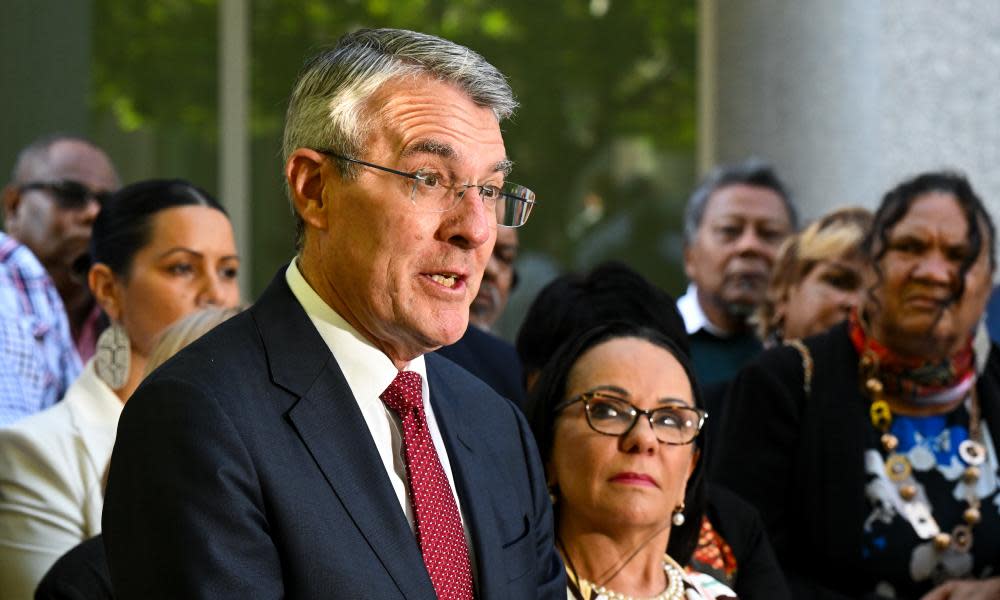Mark Dreyfus rejects human rights commissioner’s claim Indigenous voice would undermine principles of equality

Federal attorney general Mark Dreyfus “does not agree” with the human rights commissioner that the proposed Indigenous voice to parliament would undermine human rights principles of equality and non-discrimination in Australia, but would not comment on calls for the commissioner to consider her future in the role.
Related: Indigenous voice referendum bill introduced to standing ovation but Peter Dutton fails to show
In an opinion piece published in the Australian on Thursday, commissioner Lorraine Finlay wrote that the draft wording of the referendum question and proposed amendment to the constitution “inserts race into the Australian constitution in a way that undermines the foundational human rights principles of equality and non-discrimination, and creates constitutional uncertainty in terms of its interpretation and operation”.
Following her comments, five of her predecessors in the role took the unusual step of issuing a joint statement repudiating her views.
Sign up for Guardian Australia’s free morning and afternoon email newsletters for your daily news roundup
Former human rights commissioners Edward Santow, Chris Sidoti, Cathy Branson, Brian Burdekin and Graham Innes said they believed Finlay had made a “serious error” in stating that the voice would undermine human rights.
“We unanimously disagree. Not only is the proposed voice to parliament consistent with international human rights law, the voice would improve the protection of human rights in Australia,” they said in a joint statement to the Guardian.
“Recognising Aboriginal and Torres Strait Islander people in Australia’s constitution, and giving Indigenous people an effective say on issues that affect them, are ways of demonstrating Australia’s commitment to equality and the fair go.”
They said that, in their view, Finlay’s opinion is “likely to mislead Australians” who will be required to vote on this proposal at a referendum.
A spokesperson for Dreyfus said that neither he nor the government agree with Finlay’s view.
“The attorney general does not agree with Ms Finlay,” the spokesperson said. “The Australian government does not agree with Ms Finlay. We are confident the Australian people will show they do not agree with Ms Finlay when they vote at the referendum later this year.”
Earlier on Friday, Chris Sidoti, who was human rights commissioner from 1995 to 2000, told ABC Radio that in his experience the commission “works on consensus” and Finlay’s dissenting view was unprecedented and “just plain wrong”.
“I cannot recall an example or situation like this occurring in the commission’s now almost 40 years of life. So I was more than surprised, I was shocked when I read it,” Sidoti told ABC RN Breakfast.
“[Finlay] is certainly entitled to have her opinion and express it – that’s part of human rights law as well – but in doing so there are implications for her role as human rights commissioner and as a member of the commission,” he said.
He said it was for Finlay to decide “what her future within the commission is under these circumstances”.
Finlay, a former constitutional lawyer, has a five-year appointment that began in 2021.
“I’m very anxious about the current stage of debate on the voice. There is a lot of misinformation floating around, and I put this statement in the same category,” Sidoti told the ABC.
In a statement on Thursday, president of the commission, Emeritus Prof Rosalind Croucher, said that Finlay “is entitled to hold a dissenting view, just as all Australians are entitled to their views about the referendum”.
A spokesperson for the commission said Finlay would “not be commenting further at this point”.
The United Nations Committee on the Elimination of Racial Discrimination (CERD) recommended in 2017 that Australia should “accelerate its efforts to implement the self-determination demands of Indigenous peoples, as set out in the “Uluru statement from the heart”.

 Yahoo News
Yahoo News 
